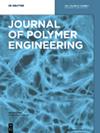环氧化大豆油对聚(l-乳酸)和聚(d-乳酸)混合物等温结晶后熔融行为的影响
IF 1.7
4区 工程技术
Q4 POLYMER SCIENCE
引用次数: 0
摘要
利用差示扫描量热法(DSC)研究了环氧化大豆油(ESO)对聚(l-内酯)(PLLA)和聚(d-内酯)(PDLA)弯管的同质结晶(HC)和立体络合物(SC)形成行为的影响。对不同ESO含量(0、5、8和10 wt%)和不同温度(90 °C、120 °C和150 °C)的ESO/PLLA/PDLA混合物进行了等温结晶,持续时间(12.5、25和125分钟)各不相同。结果发现,ESO 能有效抑制 HC 结晶,促进 SC 结晶。对于不含 ESO 的样品(ESO-0),等温结晶温度和持续时间对其熔化行为影响不大,而含有 5 wt% ESO 的样品(ESO-5),随着持续时间的增加,HC 结晶减少,而 SC 结晶继续增加。此外,在ESO含量不变的情况下,在较高的结晶温度下,SC晶体的熔化温度没有显著变化,这表明ESO不会降解PLLA/PDLA共混物。这些发现表明,ESO 改变了结晶动力学,抑制了 HC 的形成,促进了 SC 的形成,从而有利于特定材料的性能和应用。本文章由计算机程序翻译,如有差异,请以英文原文为准。
Effect of epoxidized soybean oil on melting behavior of poly(l-lactic acid) and poly(d-lactic acid) blends after isothermal crystallization
The effect of epoxidized soybean oil (ESO) on homocrystallization (HC) and stereocomplex (SC) formation behavior of poly(l -lactide) (PLLA) and poly(d -lactide) (PDLA) bends was investigated utilizing differential scanning calorimetry (DSC). Isothermal crystallization was performed on ESO/PLLA/PDLA blends with varying ESO contents (0, 5, 8, and 10 wt%) and temperatures (90 °C, 120 °C, and 150 °C) for a different duration (12.5, 25, and 125 min). It was found that the ESO could effectively inhibit HC crystallization and promote SC crystallization. For the sample without ESO (ESO-0), the isothermal crystallization temperature and duration had little effect on the melting behavior, whereas sample with 5 wt% ESO (ESO-5), HC crystallization decreased while SC crystallization continued to increase with increasing duration. Additionally, at higher crystallization temperatures with constant ESO content, the melting temperature of SC crystals did not significantly change, suggesting that ESO did not degrade PLLA/PDLA blends. These findings imply that ESO modifies crystallization kinetics, suppressing HC formation and enhancing SC formation, which could benefit for specific material properties and applications.
求助全文
通过发布文献求助,成功后即可免费获取论文全文。
去求助
来源期刊

Journal of Polymer Engineering
工程技术-高分子科学
CiteScore
3.20
自引率
5.00%
发文量
95
审稿时长
2.5 months
期刊介绍:
Journal of Polymer Engineering publishes reviews, original basic and applied research contributions as well as recent technological developments in polymer engineering. Polymer engineering is a strongly interdisciplinary field and papers published by the journal may span areas such as polymer physics, polymer processing and engineering of polymer-based materials and their applications. The editors and the publisher are committed to high quality standards and rapid handling of the peer review and publication processes.
 求助内容:
求助内容: 应助结果提醒方式:
应助结果提醒方式:


